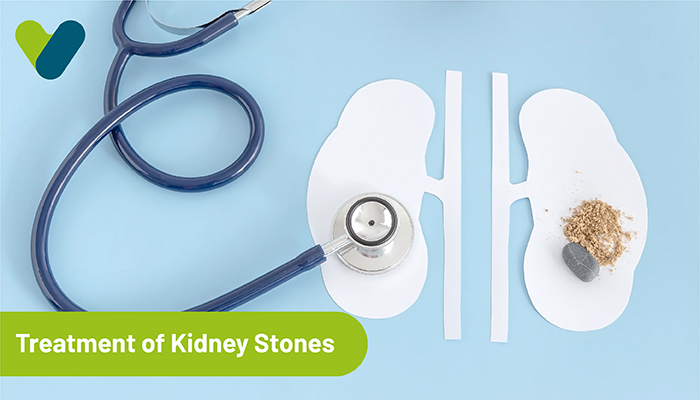A kidney stone is a solid mass or crystal that may range in size from an irregularly shaped grain, a chickpea to a much larger golf ball. Kidney stones, also called renal calculi, are hard mineral and salt deposits that occur within the kidneys. Depending on the size of your kidney stone or stones, you may be unaware that you have one. In other cases, even tiny stones may cause excruciating discomfort while passing through the urinary system. Drinking fluids may aid the recovery process, which might take up to three weeks.
What causes kidney stones?
Some of the various triggers of kidney stones are poor diet, obesity, certain supplements and drugs or certain medical conditions. Kidney stones may impact any or the entire part of the urinary system, from the kidneys to the bladder. Frequently, stones develop when concentrated urine allows minerals to crystallise together. Symptoms like pain or discomfort in the backside, blood in the urine, and nausea or vomiting are indications of kidney stones.Treatment Passing kidney stones can cause discomfort or pain, but if they are identified on time and treated promptly, they seldom cause long-term harm. Small kidney stones may cause discomfort until they are passed, which typically takes one or two days. Depending on the circumstances, you may be able to pass a kidney stone by taking pain meds and drinking large amounts of water. In some cases, surgery may be required, such as when stones are wedged somewhere in the urinary tract that can cause an infection. If you have a kidney stone condition, your doctor may advise preventative therapy to cut down your chances of having kidney stones again. A physician may prescribe medication to: • Ease pain: A physician may prescribe non-steroidal anti-inflammatory drugs for pain relief as part of your treatment for kidney stones, such as ibuprofen, for healthy adults with no medical history. • Manage nausea or vomiting: Nausea or vomiting are symptoms which can be treated with medicines. Although anti-nausea medication may be avoided by consuming copious amounts of water throughout the day. • Alpha-blockers:In this type of renal stone treatment, the alpha-blockers are medicines to help relax your ureter for the crystals to slide through. Medicines such as tamsulosin and nifedipine are often recommended. Taking the medication during an acute episode of kidney stones might increase the risk of kidney failure, particularly in patients with a history of renal disease and related conditions such as diabetes, hypertension, and obesity. • Check the colour of your urine: Your urine should have a light colour, but if your urine is dark, you are not consuming enough water. You may be recommended to maintain this fluid intake to avoid the formation of new stones. If kidney stones are giving you considerable discomfort, your primary care physician may refer you to the hospital for testing and treatment. Dos & Don’ts to facilitate stone passage: • Do make sure you are well hydrated. Beverages such as tea and coffee also count. • Do add lemon to your water. • Do not have fizzy drinks • Do not consume excessive salt
Big renal calculi treatment with surgery
Your doctor will assess whether you need treatment after diagnosis. If kidney stones are too large to pass through the urine naturally, they are often removed surgically. Your surgical procedure will be determined by the size and location of your stones. The most common surgical procedures for kidney stone removal are:Shock wave lithotripsy (SWL)
SWL uses ultrasound or high-frequency sound waves to locate the kidney stone. During this operation, you are positioned on a surgical table or tub, and high-energy shockwaves are sent through the water to break up the stones. The procedure makes it easier for them to leave your body. SWL may be a painful method of therapy. Thus, it is often administered after painkillers. You may need more than one SWL session to cure your kidney stones effectively.
Ureteroscopy In this type of kidney stone laser treatment, specialists insert a tiny telescope or a ureteroscope into the urethra, via the bladder and into the ureter. The device shows the kidney stones and then recovers them in a basket device or fragments them with a laser. These kidney stone fragments are then readily expelled from the body through the urine stream. Ureteroscopy is performed under general anaesthesia while the patient is sleeping. Percutaneous nephrolithotomy (PCNL) PCNL is performed when other procedures cannot be used to remove kidney stones. The specialists opt for this surgery when there are too many stones, or the stones are too large, or because of their location. Through a tiny incision in the back, the expert inserts a nephroscope straight into your kidney during this treatment. The stone is either extracted or split into tiny bits using laser or pneumatic energy, and then suctioned out so that no fragments are left to be passed through the urine. The doctor will install a urethral stent, which is removed after a week. The physician does the TPCNL under general anaesthesia. Typically, patients are held overnight for observation.
